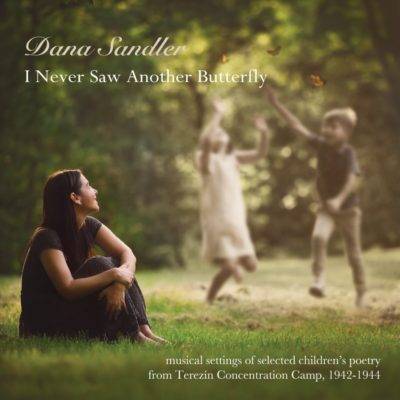Dana Sandler I Never Saw Another Butterfly
Dana Sandler
I Never Saw Another Butterfly
Self-released
I Never Saw Another Butterfly is jazz vocalist Dana Sandler’s debut, based on a book of the same name, setting poems from children of the Holocaust to music. The album is being released today, April 21, Holocaust Remembrance Day. Originally published in 1959, the book is a collection of poetry and art created by Jewish children in the Terezin concentration camp, in what is now the Czech Republic. The camp held about 144,000 prisoners, many of whom were scholars, musicians, and artists. The album is dedicated to Friedl Dicker-Brandeis, and Austrian artist and educator who organized secret classes for the children, resulting in 4,500 children’s drawings and pomes before she was sent to Auschwitz in 1944. Fifteen thousand children passed through the camp. Fewer than 100 survived.
The album is a song cycle, vocals interspersed with instrumentals, that highlights poems of three children in the camp as well as unknown poets. One of the three primary poets did survive. This quote from Sandler seems especially timely, especially since she said this well before the onset of this health pandemic. “I knew that it was meant to be for this moment, at a time where I would be composing this music through the lens of motherhood, at a time when Holocaust survivors able to share their stories are dwindling in number and at a time when, sadly, parallels today are all too present.”
Dana Sandler has been playing piano since the age of four and composing since she was nine. She is a classically trained pianist who instead focused her vocal studies on musical theater and jazz. She holds degrees in Jazz Vocal Performance from the University of Miami and the New England Conservatory of Music (NECM). She led her own quarter for Royal Caribbean Cruise Lines, honing her skills alongside her husband, drummer Austin McMahon (Jerry Bergonzi) and pianist Carmen Staff (Dee Bridgewater). The other musicians for this date are those she met at NECM including bassist Jorge Roeder (Gary Burton, John Zorn), trumpeter and flugelhornist Peter Kenagy, alto saxophonist and clarinetist Rick Stone, and clarinetist Michael Winograd.
Given the harrowing backdrop, the album is surely deeply emotional, but it never seems to sink into despair and gloom, instead conveying beauty in her sensitive interpretations, as spiritual odes in hopes that others will never suffer like these children did. The album is divided in four parts, for each of the three primary poets with a final section for those unknown. The first section is for Pavel Friedman, beginning with a lovely instrumental carried mostly by Staff’s elegant piano. Then we are introduced to Sandler’s gossamer soprano voice and clear annunciation of Pavel’s words, written just seven weeks after arriving at the camp, setting the theme – “For seven weeks I’ve lived here/Penned up inside this ghetto/But I have found what I love here/The dandelions call to me/And the white chestnut branches in the court/Only I never saw another butterfly.”
The next section is for Franta Bass, the youngest of the poets. Sandler set up a storyline revolving around the boy’s inner life in “Home/The Old House” and “The Garden.” The music begins with clarinet, which represents Franta, and bass, which represents the house. Her day dreamy music becomes even more impactful with her young daughter singing the poem “This Old House” and the chilling effect of voice and piano on “The Garden,” the album’s saddest moment – “A little boy, a sweet boy/Like that growing blossom/when the blossom comes to bloom/The little boy will be no more.”
The third section centers on Alena Synkova-Munkova, who passed away in 2008. The instrumental “Dear Elena” reflects the somber tone of the previous, played beautifully by Kenagy. The poems “Untitled” and “I’d Like to Go Alone/Ani Ma’amin” reflect a defiant, rebellious teenager. The “Ani Ma’amin” piece was composed by Azriel David Fastag while in a cattle care on its way to Treblinka, with the melody delivered impeccably by Winograd’s clarinet. This melody is frequently sung at Holocaust Remembrance Day events. The final poem of the section, “Tears” – “And thereafter come…/tears,/without them/there is no life./Tears-/Inspired by grief/tears/that fall like rain.” Bassist Roeder delivers a captivating bass solo.
The anonymous poets, between ages 10-16, hold the final section. “On a Sunny Evening” and “Birdsong” are hopeful tunes, the former featuring a soaring alto sax from Stone. The final lines of “Birdsong/Butterfly Reprise” contain and uplifting message – “Then if the tears obscure your way/You’ll know how wonderful it is/To be alive.”
Don’t be dissuaded by the harrowing subject matter. This is beautiful music created and delivered by inspired musicians, endeavoring to make an important statement. Sandler’s voice alone is worth the listen.
- Jim Hynes.
Discover more from Making A Scene!
Subscribe to get the latest posts sent to your email.













































